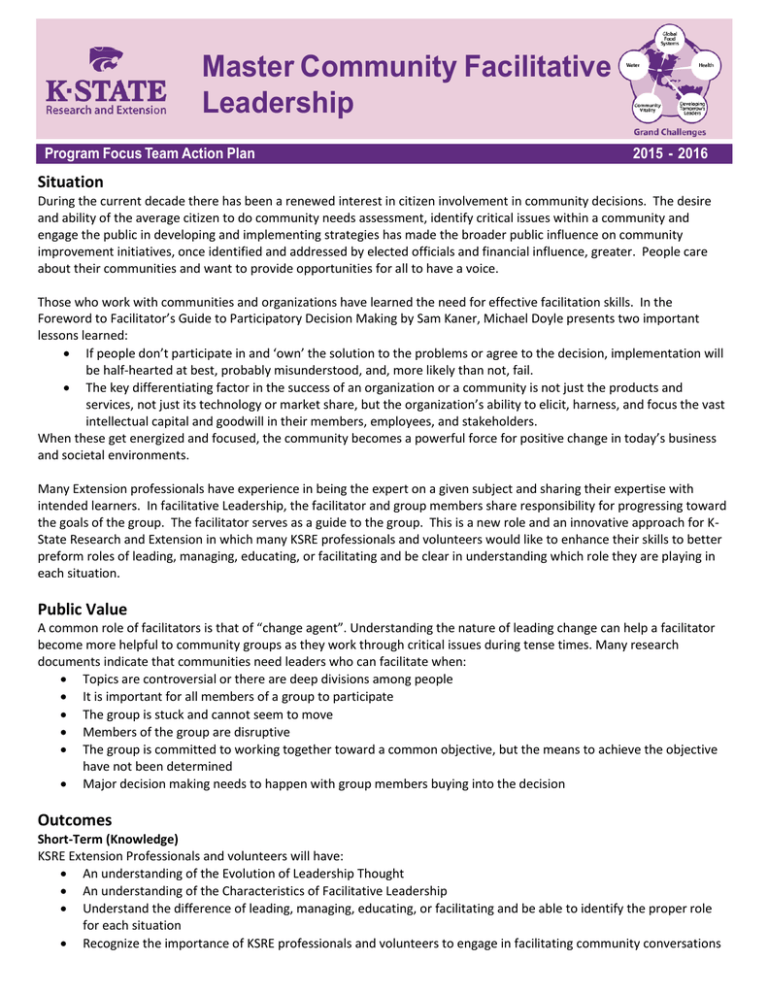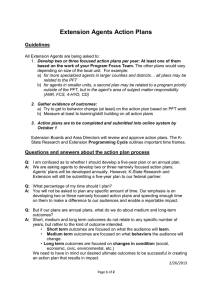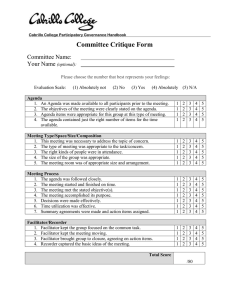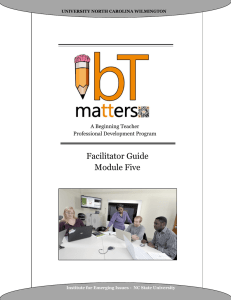Master Community Facilitative Leadership Situation
advertisement

Master Community Facilitative Leadership Program Focus Team Action Plan 2015 - 2016 Situation During the current decade there has been a renewed interest in citizen involvement in community decisions. The desire and ability of the average citizen to do community needs assessment, identify critical issues within a community and engage the public in developing and implementing strategies has made the broader public influence on community improvement initiatives, once identified and addressed by elected officials and financial influence, greater. People care about their communities and want to provide opportunities for all to have a voice. Those who work with communities and organizations have learned the need for effective facilitation skills. In the Foreword to Facilitator’s Guide to Participatory Decision Making by Sam Kaner, Michael Doyle presents two important lessons learned: If people don’t participate in and ‘own’ the solution to the problems or agree to the decision, implementation will be half-hearted at best, probably misunderstood, and, more likely than not, fail. The key differentiating factor in the success of an organization or a community is not just the products and services, not just its technology or market share, but the organization’s ability to elicit, harness, and focus the vast intellectual capital and goodwill in their members, employees, and stakeholders. When these get energized and focused, the community becomes a powerful force for positive change in today’s business and societal environments. Many Extension professionals have experience in being the expert on a given subject and sharing their expertise with intended learners. In facilitative Leadership, the facilitator and group members share responsibility for progressing toward the goals of the group. The facilitator serves as a guide to the group. This is a new role and an innovative approach for KState Research and Extension in which many KSRE professionals and volunteers would like to enhance their skills to better preform roles of leading, managing, educating, or facilitating and be clear in understanding which role they are playing in each situation. Public Value A common role of facilitators is that of “change agent”. Understanding the nature of leading change can help a facilitator become more helpful to community groups as they work through critical issues during tense times. Many research documents indicate that communities need leaders who can facilitate when: Topics are controversial or there are deep divisions among people It is important for all members of a group to participate The group is stuck and cannot seem to move Members of the group are disruptive The group is committed to working together toward a common objective, but the means to achieve the objective have not been determined Major decision making needs to happen with group members buying into the decision Outcomes Short-Term (Knowledge) KSRE Extension Professionals and volunteers will have: An understanding of the Evolution of Leadership Thought An understanding of the Characteristics of Facilitative Leadership Understand the difference of leading, managing, educating, or facilitating and be able to identify the proper role for each situation Recognize the importance of KSRE professionals and volunteers to engage in facilitating community conversations Indicators What knowledge and skills did participants gain related to the different approaches to leadership from control to shared? What knowledge and skills did participants gain related to the difference between a presenter, learning facilitator and facilitative leader? What knowledge and skills did participants gain related to the need to clearly define their role in each group setting? Medium-Term (Behavior) KSRE is involved in facilitating conversations related to the 5 Grand Challenges in communities KSRE professionals and volunteers are serving in multiple roles including educator, learning facilitator, and facilitative leader KSRE professionals and volunteers have a toolbox of approaches that can be used for effective decision making KSRE professionals and volunteers are seeking out opportunities to serve as facilitators at the local and regional level Indicators Have you recently served as a facilitator of a community conversation? During the last year what leadership roles have you played related to educator, leader, manger, and facilitator? What tools have you found most useful? What has been the public value of providing facilitative leadership within your community? Long-Term (Change in Condition) Kansas communities are: believing that groups can make good decisions sharing a sense of group goals using effective processes utilizing diversity and wisdom improving continuously working together with trust progressing toward goals learning from experiences Indicators How many community initiatives have been sustained? How many groups or individuals are involved in participatory community planning? What improvements have been made at the community or regional level as a result of facilitated community conversations? Do communities report increased capacity to address critical issues with positive results? Outputs Training-The Art of Facilitation: Building Your Palette of Skills Training-New Agent Orientation/The Art of Extension/Programming With a Purpose Program-Master Community Facilitator Kansas State University Agricultural Experiment Station and Cooperative Extension Service. K-State Research and Extension is an equal opportunity provider and employer


